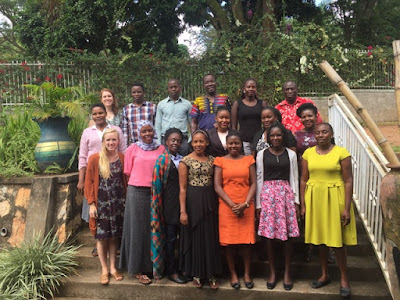 |
| Mukono Church of Uganda Hospital main entrance in Mukono town. |
Imagine this:
It's 6:00pm on a Friday night. The sun is setting behind Mukono hill, and campus is quieting down for the weekend. Homestay students are headed for the gates of UCU, home to their families for the weekend, and on-campus students are headed down to the dining hall for dinner. But you're a Global Health student and you're about to embark on a 12-hour hospital night shift. You have the name of the nurse midwife and the doctor on call, and so you pull on your USP Global Health student scrubs, grab a cup of coffee--and head into town with a friend for your first night shift at the Church of Uganda Mukono Hospital.
As part of the Global Health Emphasis, all students do a 150-hour internship at a local healthcare organization in Uganda. USP partners with a diverse array of organizations offering internships in a variety of areas and specialties like nutrition, maternal health, physical therapy and geriatric care. The Mukono Church of Uganda Hospital, located in close proximity to Uganda Christian University, has a long-standing relationship with USP and is a significant part of the Global Health Emphasis. It is the internship site for several GHE students in any given semester, students taking Microbiology do their lab at the hospital, and others take the unique opportunity to shadow doctors, nurses, and other hospital staff from 7:00pm— 7:00am: The Night Shift. Over the twelve-hour shift, students experience what it's like to work at a hospital overnight and the diversity of cases that keep a hospital busy around the clock.
It's 2:00am. Since you arrived at the hospital, you've been in the operating theatre during an emergency C-section, a nurse has explained her perspective on the cultural and socioeconomic complexities of maternal health in Uganda, and you've taken tea with the surgeon on call. You're about to take a brief nap on a hospital cot when a patient comes in to the emergency department with a broken leg from a motorcycle accident. Adrenaline infuses your body with life again as you help the hospital team to care for this emergency. At the end of the night, you collapse in the back of the USP van as it travels back up the hill to UCU, exhausted but with a deeper understanding of and appreciation for the work of nurses and doctors throughout the long night hours.
Spending a night at the hospital is an unique opportunity in many ways. When it's busy, you are able to observe procedures you may not be able to during the day. When it's slow--and it often is--you have the opportunity to spend real time with Ugandan healthcare professionals, learning through conversation and quality time in the wee hours of the night. The night shift at Mukono Hospital is above all a time to practice presence, being with patients who are in pain, being with health care professionals as they care for the patients, and being open to whatever happens--or doesn't happen--during a normal 12-hour day shift at the hospital.
Whether learning about maternal health on a night shift or sitting under a Mango tree learning about clean water, the Global Health Emphasis brings together observation, experience, and academic coursework with the goal of transformational learning.




